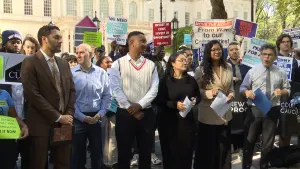Candidates scrambling to get on August primary ballot
Political candidates across Connecticut are pounding the pavement this weekend. They're scrambling to collect hundreds of signatures by Tuesday to get on the August primary ballot.
Share:
More Stories
2:34

Guide: Safety tips to help prevent home burglaries
484ds ago2:19

Guide: Safety measures to help prevent fires and how to escape one
632ds ago2:40

Mayor's budget cuts: A controversial solution amidst immigration crisis
650ds ago2:07

Tips on how to avoid confrontation with sharks while swimming in the ocean
716ds ago2:33

5 tips to prevent mosquito bites and getting sick from viruses
727ds ago2:39

NEWS 12 EXCLUSIVE: ‘He drove into the water.’ Car drives off dock in Patchogue; News 12 crew helps in the rescue
747ds ago2:34

Guide: Safety tips to help prevent home burglaries
484ds ago2:19

Guide: Safety measures to help prevent fires and how to escape one
632ds ago2:40

Mayor's budget cuts: A controversial solution amidst immigration crisis
650ds ago2:07

Tips on how to avoid confrontation with sharks while swimming in the ocean
716ds ago2:33

5 tips to prevent mosquito bites and getting sick from viruses
727ds ago2:39

NEWS 12 EXCLUSIVE: ‘He drove into the water.’ Car drives off dock in Patchogue; News 12 crew helps in the rescue
747ds agoPolitical candidates across Connecticut are pounding the pavement this weekend. They're scrambling to collect hundreds of signatures by Tuesday to get on the August primary ballot.
Charneil Bush is one of them. He wants to take on longtime Democratic state Sen. Joan Hartley in Waterbury. But first, Bush has to gather more than 1,000 signatures from registered Democrats – and state election law only gives him 14 days to do it.
"Including a holiday weekend," he said with a laugh.
In Connecticut, political parties pick their candidates at conventions. But others can force a primary and let voters decide, if they get 15% of convention delegates' votes. They can also collect signatures from 5% of registered party members – but the window is only two weeks for state legislature candidates. Candidates for Congress and statewide office get 42 days.
Before 2003, candidates didn't even have the option to collect signatures. A federal lawsuit changed that.
Sacred Heart University political analyst Dr. Gary Rose says both parties designed the system to favor their endorsed candidates.
"Who you see on the ballot is normally the convention choice," he said. "The party organization runs the conventions, and the conventions decide who the candidates will be."
Connecticut has one of the nation's most restrictive ballot access laws. Although Rhode Island has an even shorter window – just nine days -- candidates only have to collect 50-100 signatures. New York gives candidates six weeks. In Massachusetts, they get 11 weeks – although statewide candidates also have to get 15% support at their party convention.
In Connecticut, a spokesman for the secretary of the state's office says signatures need to be in by June 7 so there's enough time to verify signatures and get ballots printed.
In 2020, one candidate actually sued, claiming Connecticut's restrictive ballot access laws are unconstitutional. But a federal judge upheld the time limits, writing, "Though the requirements certainly are a burden on candidates – perhaps even a significant one – they do not constitute a 'severe burden.'"
Try telling that to Charneil Bush, who's taking time off from his full-time job to canvas.
"And I'm a full-time parent," he said.
But until Tuesday, his main job is knocking on doors.
More from News 12
1:11

Zohran Mamdani wins New York City’s Democratic mayoral primary, defeating ex-Gov. Andrew Cuomo
10:38

Power & Politics: The rise of Mamdani and what it means for the NYC mayoral race
1:43

Sources: Cuomo considers staying in NYC mayoral race
1:40

Adams holds reelection campaign kickoff outside City Hall
1:54

Mamdani's primary performance divides Democrats
2:49
